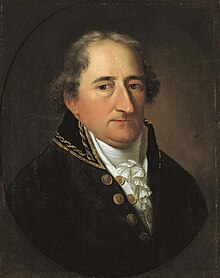
Back هاينريش فريدريش كارل من والى الحجر ARZ Хайнрих Фридрих Карл Щайн Bulgarian Heinrich Friedrich Karl vom und zum Stein Czech Heinrich Friedrich Karl vom und zum Stein Danish Heinrich Friedrich Karl vom und zum Stein German Χάινριχ Φρίντριχ Καρλ φομ Στάιν Greek Heinrich Friedrich Karl vom und zum Stein Esperanto Heinrich Friedrich Karl vom Stein Spanish Heinrich Friedrich Karl Reichsfreiherr vom und zum Stein Basque هاینریش فریدریش کارل فم اوند تسوم اشتاین Persian
You can help expand this article with text translated from the corresponding article in French. (October 2024) Click [show] for important translation instructions.
|
Heinrich Friedrich Karl vom und zum Stein | |
|---|---|
| Reichsfreiherr | |
 Heinrich Friedrich Karl Reichsfreiherr vom und zum Stein (painting by Johann Christoph Rincklake) | |
| Born | 25 October 1757 Nassau, County of Nassau, Holy Roman Empire |
| Died | 29 June 1831 (aged 73) Cappenberg Castle, Province of Westphalia, Kingdom of Prussia |
| Occupation | Politician; Minister |
Heinrich Friedrich Karl vom und zum Stein (25 October 1757 – 29 June 1831), commonly known as Baron vom Stein, was a Prussian statesman who introduced the Prussian reforms, which paved the way for the unification of Germany. He promoted the abolition of serfdom, with indemnification to territorial lords; subjection of the nobles to manorial imposts; and the establishment of a modern municipal system.
Stein was from an old Franconian family. He was born on the family estate near Nassau, studied at Göttingen, and entered the civil service. Prussian conservatism hampered him in his efforts to bring about changes. In 1807, he was removed from office by the King for refusing to accept the post of Minister of Foreign Affairs but was recalled after the Peace of Tilsit.
After it became known that he had written a letter in which he criticised Napoleon, Stein was obliged to resign, which he did on 24 November 1808 and retired to the Austrian Empire, from which he was summoned to the Russian Empire by Tsar Alexander I in 1812. After the Battle of Leipzig in 1813, Stein became head of the council for the administration of the reconquered German countries.